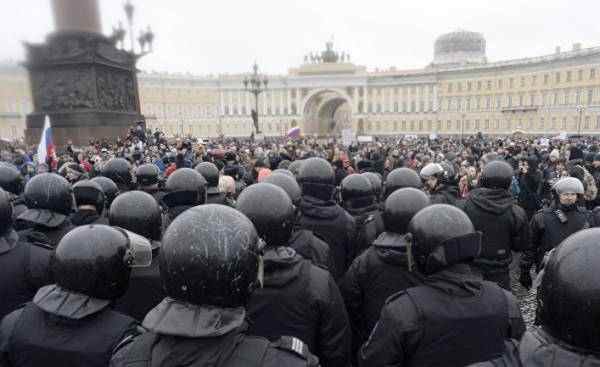
Reinforcing anti-Putin tendencies, you help your pet Navalny, who enjoys the support of about two percent of Russians, and the Russian Communists. “In the year of the centennial anniversary of the great October socialist revolution in Russia going left” — so the editor of the newspaper Literární novinу Teresa Spentserova commented on the recent protests against Dmitry Medvedev, in which accepted the participation of tens of thousands of Russians, and warns Western leaders about the consequences. Traditionally summing up the results of last week on the portal Parlamentní Listу, Spentserova explains the new situation in the middle East after the United States lost a considerable part of its influence.
Parlamentní Listу: Recently CNN expressed another concern about Vladimir Putin. According to experts, which turned the TV channel, the Russian President can invade two unstable countries — Afghanistan and Libya. The two we have already discussed, so please tell me… Maybe somebody’s got an active imagination? Or in such forecasts is rational? As for Libya, there is Putin, there is someone to rely on, but about Afghanistan will say this.
Recently the American publication The Hill complained in his commentary that Russia has one unfair advantage: its army is not necessary persistently to bombard and occupy seven countries (under Obama). Instead, the Russian army can easily concentrate on your upgrade and not absorb so much money. The idea that while military involvement in Syria, the Russian army would force the seizure of another country is absurd, because it is unlikely that Russia wants to get into heavy debts, as the United States.
And — most importantly — how Russia could join the fight against the United States, which took Afghanistan “rent” and for 17 year unsuccessfully trying to establish their own rules? Interestingly, recently, the Afghan Taliban (not a terrorist organization) are increasingly being touted as (with some reservations) the national liberation movement, which, though reactionary, but it has made no attempt to move its fight to the country’s borders. At a time when Afghanistan is attempting to gain a foothold and even “Islamic state” (banned in Russia as a terrorist organization — approx. ed.), relations with the Taliban support for the benefit of future development of the country and the Chinese and the Iranians, the Pakistanis, and Russians. The Americans, in turn, for several years now want to start “peace talks” but does not find in the “Taliban” to anyone who would want to talk to them and would enjoy sufficient authority. And CNN no longer.
— Let’s turn to the already “done work” for the Russian President. Recently you said that in Syria, Putin began to exert pressure on Israel to cease to interfere. (Israel resented that Syrian territory military operations were conducted against him, and answered them.) Putin is a pretty harsh with Prime Minister Netanyahu. How strong is the middle East Putin’s Alliance with Iran and Assad? Talking about the “Shiite coalition” that opposes, primarily the rich Gulf States, supported by the Americans. As you say, Americans are actually very weak in the middle East, but how?
Yes, Israel is perturbed because the Syrian air defense strikes at Israeli jets flying over Syrian territory. It’s weird. However, personally, I have a feeling that those big words are heard from Israel about Syria, Hezbollah, Lebanon and Iran, are designed rather to divert attention from the looming governmental crisis, from the investigation of the case of corruption, Netanyahu, from the divisions of Israel trump, who opposes the ongoing rejection of Palestinian territories, from two reports of the UN, which referred to the system of apartheid in Israel… so in the end actions will not be as serious as the words.
Given that the Shia are a small minority among Muslims, all the talk about the “Shiite coalition” should be taken as assumptions about future events. Tehran, being the capital of the Shiite world, enjoys considerable influence in Iraq and Syria, and now with the help of Hezbollah, he was able to gain a foothold in legitimate political space of Lebanon. However, I do not think that all these countries will become a puppet of Iran. Rather, they are all United by common interests, not blind obedience. Russia works closely with the “Alliance”, but it supports the establishment or the preservation of the secular regimes in Syria, Egypt, and in the future — and in Libya. From the point of view of the situation in the middle East and the interests of the reactionary Sunni monarchies of the Persian Gulf, this “axis” can play an important role, beyond the problem of “Shiites vs Sunnis”. However, it is too early to draw any final conclusions.
Since, as happened in the first performances of the Arab spring and the Tunisia and Egypt lost their popular vassal dictators, the US lose influence, and the destruction of Libya did not contribute to their popularity in the region. It is unclear what will happen next. Trump’s slogan “America first” suggests that this trend will continue, but there is growing evidence, after the liberation of Mosul Americans “share” with Iran’s influence in Iraq. If it happens, I would not make more bets on the US, because in Iraq, they’ve already destroyed one, the Americans unpopular. And they can only be put on the sectarian differences between Shiites and Sunnis, but the question is how sharp they conflict, and whether the United States actually to use it.
In recent days, Putin has faced a wave of protests against the corruption of their system against the Prime Minister Medvedev. Depending on the number of protesters plausible? Published impressive video, and Pro-Western Bulk again declared itself, but was the event really so dramatic? Someone said they were against it, primarily young people, and had such a parallel: it is the younger generation can do with the Putin regime what did the young Tunisians and Egyptians during the so-called Arab spring, when young people without much hope for a better life, thoroughly shook the system using social networks. Whether it is the desire of the father of the analysis? You were a revolutionary in Egypt and could tell. And in General, whether you are the representative of modern Russian youth, you would have protested?
— Let’s order. It is strange that the protests were directed against the “corrupt” Medvedev, not personally against Putin. Turns out, the critics did not dare to encroach on the icon, which continues to enjoy the support of around 80%. But they “missed”. As if they did not know that Putin, who last month almost “hastily” cleaned out the ranks of senior government officials and military leaders, could not formally admit that the Prime Minister of his government is corrupt, and for the sake of your own image will not let him resign.
It is also strange that in the 12 millionth Moscow in the demonstration was attended by about ten thousand people, and even if we add other cities, there are no “millions of dissatisfied Russians,” reported the American mainstream, will not work. Strange also that the Parliament attack on Medvedev was supported by the opposition Communists.
At home, Medvedev is considered “Pro-Western liberal”, and Russian society since the days of the Yeltsin collapse again begins to levet. Western sanctions have only strengthened this trend. So now, in the year of the centenary of Lenin’s revolution, the attack on Navalny, the Kremlin can help not those who (or what) was planned. That is, we need to pay more attention to their own desires. Incidentally, it is strange that the West continually praises Navalny, who has the support of about two percent of the electorate. He’s not a Democrat, but rather, ultranationalist and xenophobic. Perhaps this is the main reason that Western mainstream calls it mostly “Putin critic”, especially without going into details.
I don’t know why the demonstrations in Russia compared with the Arab spring, especially since they are, at least in the near future, in nothing will result. However, I would have corrected your words about social networks. I attended Cairo’s Tahrir square from the first minute of the revolution and I can say that the first days the army and police dealt there with thousands of young (and not only) people, while the rest of Egypt was sitting at home on Facebook and “like” in support of the revolution like crazy. But then someone — still unknown who took the Internet and mobile networks, and the people sitting at home, lost the opportunity to monitor the situation. Therefore, they had to go to Tahrir to see it with my own eyes. Having seen the events, people spontaneously began to join thousands and tens of thousands, until they had gathered “millions”. In other words, although the concept of a “Facebook revolution” is already established, the fact that if then someone off the Internet, the dictator, Hosni Mubarak might still would be the leader of Egypt.
The same doubt is the Iranian green revolution of 2009, when the concept “Facebook-revolution” probably appeared for the first time. Then the Western media exaggerated the organizational messages and calls “young revolutionaries”, but no one wondered why young Iranians, in fact, write each other in English, not Farsi. It later turned out that all of this was a re-enactment group of Iranian immigrants in the West who knew that in the Western mainstream one Persian speaks, therefore, the real messages in social networks would have remained “dumb”. The problem is that the word “green” in the name of the Iranian “revolution” meant a connection with Islam, but we in the West, who likes the color revolutions, no one understood or wanted to understand. The same situation is with Bulk today: we see what we want.
If I were a young Russian woman? I can’t imagine it, but in General, young people always go to demonstrations around the world — with the exception of the Czech Republic and rallies for the legalization of “grass”. So Churchill, who said: who in his youth has no heart, that in old age there is no reason, was right…
— Since we’re talking about the Egyptian revolution, I remind you that, according to media reports, the ousted dictator Hosni Mubarak have been released. What does that say about modern Egypt, ruled by the strong hand of President Al-Sisi? This is another symbolic failure of US policy that did not support Mubarak and sided with radical Islamist, former President Morsi, who remains in custody?
— I do not think that the release of Mubarak from prison hospital was another American failure. In 2011, when the Arab spring began, the US could not understand, what is actually happening. And after “unexpectedly” Mubarak resigned, they had to look for a new ally. The fact that it found in the face of “Muslim Brothers”, only created new problems, because Egypt has never been and will not be like Kandahar under the Taliban. On the whole the Egyptians are not so fanatic Muslims. However, they clearly understand who supported Mubarak and Morsi. The result is a pretty strong anti-Americanism…
The release of Mubarak is better to associate with the restoration of the free Saudi oil supplies to Egypt. For a long time, Mubarak has been a staunch ally of the Saudis, and now, apparently, he turned into “goods for exchange”. In this barter, the Saudis praised his achievements. But I don’t think that in the future they are counting on him as a politician. Rather they will prefer to attract the sons of Mubarak or any of his closest associates. By the way, today, former members of the once ruling party of Mubarak sit in the Egyptian Parliament.
By the way, if the subject of such barter will become ex-President Morsi is still residing in prison, the transaction will be concluded with Turkey.
— The European Union celebrated the 60th anniversary of the Treaty of Rome. Sounded loud statements about the success of Europe, which has never been so United. And is there anything to celebrate? May, rights, Vaclav Klaus, wrote that such rhetoric is reminiscent of Communist functionaries and that European leaders did not seem able to decide even “restructuring”? What is your opinion about the fact that of all member countries Czech Republic the least, as it turned out, praises the EU?
— A senior and I must say that support of the EU heads of 27 countries-EU members do reaffirmed their determination to continue the construction of a United Europe even after leaving the UK. In their Declaration, they stressed that the European Union should be one and indivisible. Of course. If only to forget that some countries have adopted the Euro and others not, some governments support the migration and not others, that the North despises the EU South, some countries would prefer to abandon sanctions against Russia, and not others, that some countries want the “dual” of Europe, thereby virtually eliminating the unity… nothing to Rejoice, especially when you think how easy that subscribe a pathetic Declaration, that cause officials have the joy of children, but have no relation to reality. This game can continue for several rounds, while the audience is left not so much…
Why we were the biggest skeptics? I don’t know, but I think this only compounded the sense of stagnation and some disorientation that prevails in our society. Whether leaving the EU really be a solution to the problem, I don’t know, but we’re not British, and we all have to see the consequences of their decision. Output would reform the EU, but we are not strong enough to achieve it, not to mention the fact that most of the parties who win the parliamentary elections, rather the current situation. This stagnation paralyzes.
The last time we did not have time to discuss the terrorist attack in London. You just said I foresee the “pathos” of Western politicians. It was not pathos, this time less? Could an objective observer to notice that the European society to such things, although they are horrible, used? There were different reports that the attacker was a loner, was older than the other terrorists, and even that he “was radicalized in adulthood”. Is it possible to add something? And tell me, please, how do you evaluate the views expressed on the BBC, that the media should not convey too much information about such attacks because it pleases the terrorists?
— Pathetic was the fact that the terrorist was allegedly mentally disturbed “lone wolf”, which is not taken nor an explosive belt or the machine, and grabbed a knife. With all due respect to the victims of the offense, of course, can be qualified as a terrorist act, but you can look at it differently. All complicated by the fact that the crime scene was the UK, where the Ministry of internal Affairs for two years delays the adoption of the law on combating extremism, because it can not find the exact legal definition.
Get used to it? Over the last 20 years Europe has experienced these terrorist attacks in 2004 in Madrid, a year later in London and in Paris two years ago. All you can argue than in fact they were. And I have to admit that even notwithstanding that the attacks are not stopped life on the continent and society went on. Habit is it? Or just the natural course of life? It is clear that the media always all be to fan events, because negative news “sells”, but what kind of effect all this has on the psyche, I don’t know.
In the end, a traditional question. For what we should watch next week?
American firm Crowdstrike, is that the Democrats hired to search for a “Russian trace” in the case of the hacker attack on emails of the Democratic party, just removed a key part of his initial and without that not too credible report. So from a Russian trace there’s nothing left. Somebody in Washington just in case this didn’t notice it, and the rest will start looking for a new anti-Putin theme. It will be interesting to see what they will offer this time.







